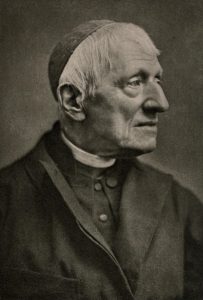


John Henry Newman was an English theologian, poet, and academic who was born in London in 1801. He was a leading figure in the Oxford Movement, which sought to revive traditional Catholic doctrine within the Church of England. In 1845, Newman converted to Catholicism and was ordained a priest in 1847. He founded the Oratorians, a religious congregation, and served as rector of the Birmingham Oratory from 1849 until his death in 1890.
Newman was a prolific writer and produced a vast body of work, including theological treatises, sermons, poems, and essays. His most famous work is the Apologia pro vita sua, a spiritual autobiography in which he recounts his journey from Anglicanism to Catholicism. Newman was a complex and controversial figure, but he is widely regarded as one of the most important figures in the history of English Catholicism.
Early life and education
Newman was born into a wealthy and devout family. His father, John Newman, was a banker, and his mother, Jemima Fourdrinier, was the daughter of a wealthy paper manufacturer. Newman was educated at Ealing School and Trinity College, Oxford. He was a brilliant student and won a number of academic prizes.
Oxford Movement
After graduating from Oxford, Newman was ordained a deacon in the Church of England in 1824. He was appointed a fellow of Oriel College in 1826 and a tutor in 1828. In 1833, he became vicar of St. Mary’s, the University Church of Oxford.
Newman was a leading figure in the Oxford Movement, which sought to revive traditional Catholic doctrine within the Church of England. The movement was inspired by the writings of the French theologian John de Maistre, who argued that the Church of England was a branch of the Catholic Church. Newman and other members of the Oxford Movement argued that the Church of England should be more faithful to its Catholic heritage.
Conversion to Catholicism
In 1841, Newman published a series of articles in the British Critic in which he argued that the Church of England was not a true church. He argued that the Church of England had lost its apostolic succession and that its bishops were not validly ordained.
Newman’s arguments caused a great deal of controversy. He was accused of heresy and was forced to resign his position as vicar of St. Mary’s. In 1845, he converted to Catholicism and was received into the Church by Cardinal Wiseman.
Priesthood and later life
After his conversion, Newman spent a year in Rome studying for the priesthood. He was ordained a priest in 1847 and was appointed rector of the Birmingham Oratory in 1849. He served as rector until his death in 1890.
Newman was a prolific writer and produced a vast body of work, including theological treatises, sermons, poems, and essays. His most famous work is the Apologia pro vita sua, a spiritual autobiography in which he recounts his journey from Anglicanism to Catholicism. Newman was a complex and controversial figure, but he is widely regarded as one of the most important figures in the history of English Catholicism.
Legacy
Newman was a towering figure in the history of English Catholicism. He was a brilliant theologian, a gifted writer, and a charismatic leader. He helped to revive traditional Catholic doctrine within the Church of England and played a leading role in the Oxford Movement. He is also the author of the Apologia pro vita sua, a spiritual autobiography that is considered one of the most important works of English literature.
Newman was canonized by Pope Benedict XVI in 2019. He is now known as Saint John Henry Newman.